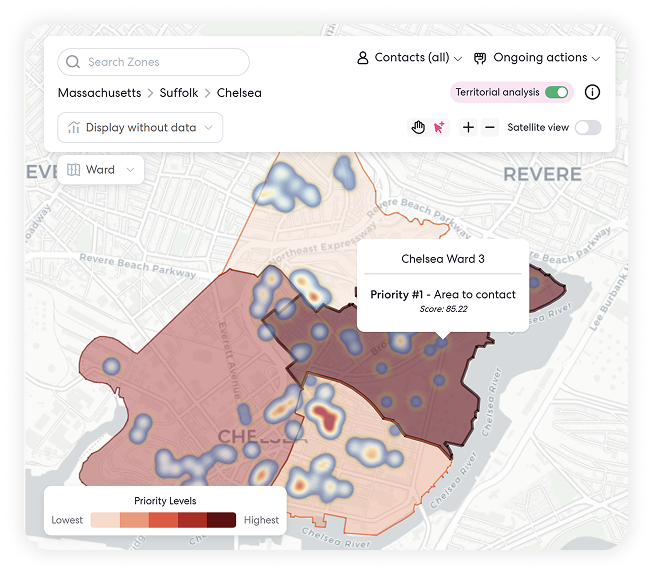After 15 years in the field, one lesson sticks harder than any poll number or predictive model: people stay where they feel seen.
I recently interviewed Elijah & Madisyn from Patriot Grassroots for the Art of Campaigns podcast, and they said something that I think deserves to be on a poster in every field office:
“Your canvassers are your number one customer.
Without them, you can’t knock any doors.”
Campaigns bleed volunteers for dumb, preventable reasons. Some campaigns forget to write down what a new volunteer is interested in. Some don’t follow up. Some only reach out when they need bodies on a weekend. Others still burn them out by driving their folks too hard, assigning them stuff they don’t want to do, skipping training entirely, or just snapping at people as the election gets close and patience wears thin. I’ve seen all of it.
Unsurprisingly, when that happens your volunteers start disappearing. Because volunteers have plenty of options for what to do with their time, they end up ghosting your texts, saying they’re busy, or quietly joining another campaign. One that treats them better. This isn’t a small problem. One volunteer can knock over 100+ doors in a typical shift, and compounded over the rest of the campaign, that’s over a thousand voters you didn’t reach this campaign. It’s not hard to see how losing volunteers causes catastrophic failure.
That’s exactly why your volunteer retention plan is your ground game. We always say, if you're failing to plan, you're planning to fail. That doesn't just apply to your media budget or your voter targeting plan. Especially as the campaign heats up and stress levels rise, things fall through the cracks. If you don’t have a formal structure for volunteer follow-up, you're just hoping they stick around. Spoiler: they won’t.
Madisyn put it like this: “If this is something you want to do, then your job really doesn't end when the campaign does.”
Once you build those relationships, you can't just let them drop off. And whoever built the relationship in the first place should be responsible for shepherding that volunteer through the rest of the campaign. That means assigning one staffer to own the follow-up, track preferences, check in, and keep notes.
This isn’t optional. This is the field plan.
If someone says they like text banking but hate phones, don’t assign them to make calls. If someone wants to knock doors on Saturdays only, don’t put them down for Wednesdays.
Ask people what they want to do... and then give it to them. This is an easy way to show respect, but it’s also easy to overlook, especially if there is no retention plan written down and assigned to a staffer.
Similarly, nothing burns out new volunteers faster than being dropped into a task they weren’t prepped for. That awkward “what do I say?” moment at the first door is when you lose people, not because they hate the campaign, but because you made them feel like they were set up to fail. Invest in training. Write a script, and practice it in the office before folks go out for the day. Spend some time and roleplay the interactions. It might feel silly, but better to feel silly in the office here with you than at the door with the voter.
Follow up regularly. You don’t need to send a thank-you text after every single shift. But if the only time someone hears from you is when you need them to show up, don’t act surprised when they stop replying. Madisyn said it clearly: “It’s easy to get a text outside of the cycle and roll your eyes and put the phone down. But one day, you’re going to wish you still had that relationship.”
A great way to do that is to pay attention to the little things. If a volunteer mentions they like a certain soda, and it shows up in the fridge the next week, that’s a message. It says: we see you. It’s a lot more powerful than some mass-text asking people to “come back” for GOTV. Send them a photo of the snacks and say, “Hey, stocked your favorite.” That’s how you reconnect without begging, and without resorting to the same “are you available this weekend” texts.
If you really want to keep someone coming back, give them a title. Calling someone a “door captain” or “neighborhood lead” might seem like fluff, but it gives them a purpose, and it expands your campaign infrastructure. Once someone owns a title, you owe them more training, and they get more responsibility. That’s how you build real neighborhood teams and you build the future bench of your party. They can become precinct captains, committeemen, or might even run for something themselves someday.
Finally, volunteers need to see how their work contributes to victory. Telling them, “We ID’d 300 voters this weekend” is what keeps people coming back. Campaigns get stressful, and burnout and depression are more common than they should be. But seeing the fruits of their labor gives people a reason to hope, and it helps drive them to stay involved. Show them how their 2-hour shift at the doors fits into the win on election day.
Focus on the long game.
You don’t build a campaign in a vacuum. You build it on relationships, and relationships aren’t seasonal. Volunteers who feel valued stick around. They come back. They recruit their friends. Sometimes, they even run for office themselves. But if you treat them like disposable labor, they’ll treat your campaign the same way.
If you’ve never built a volunteer retention plan before, or if you're starting your first campaign, this kind of structure should be part of your core strategy. This is why I bake it into every plan I build for candidates. The field program that wins is the one that actually keeps its people.
You can either make that your competitive advantage, or you can hand that advantage off to your opponent.
–

Caitlin Huxley bridges data and strategy to help moderates win close races, leveraging 15 years of experience. She’s the author of Ancient Wisdom for Modern Campaigns: Lessons from Sun Tzu’s Art of War and host of the Art of Campaigns podcast. She also works 1-on-1 with candidates to build winning campaign strategies through the Huxley Campaign Strategy Framework.
https://www.linkedin.com/in/caitlinhuxley/












.jpg)
.jpg)

.jpg)
